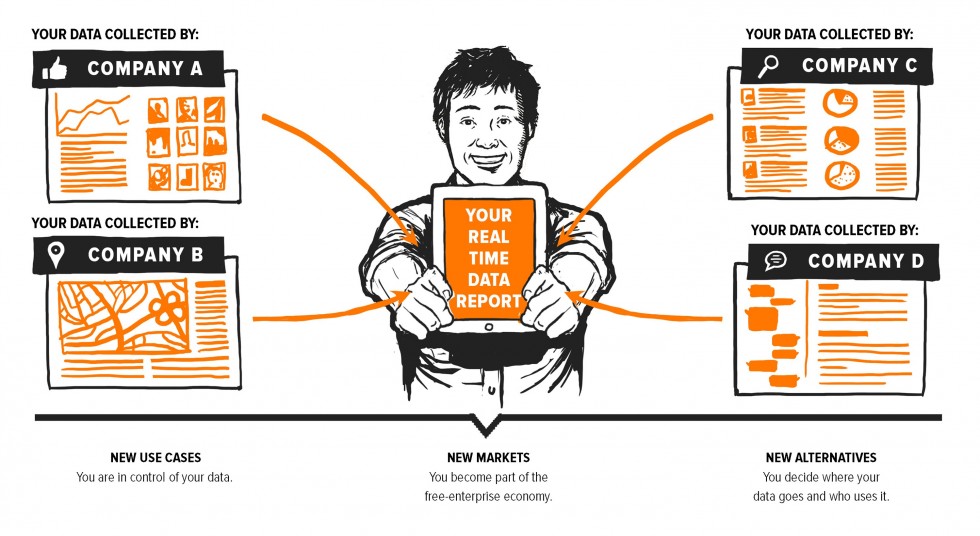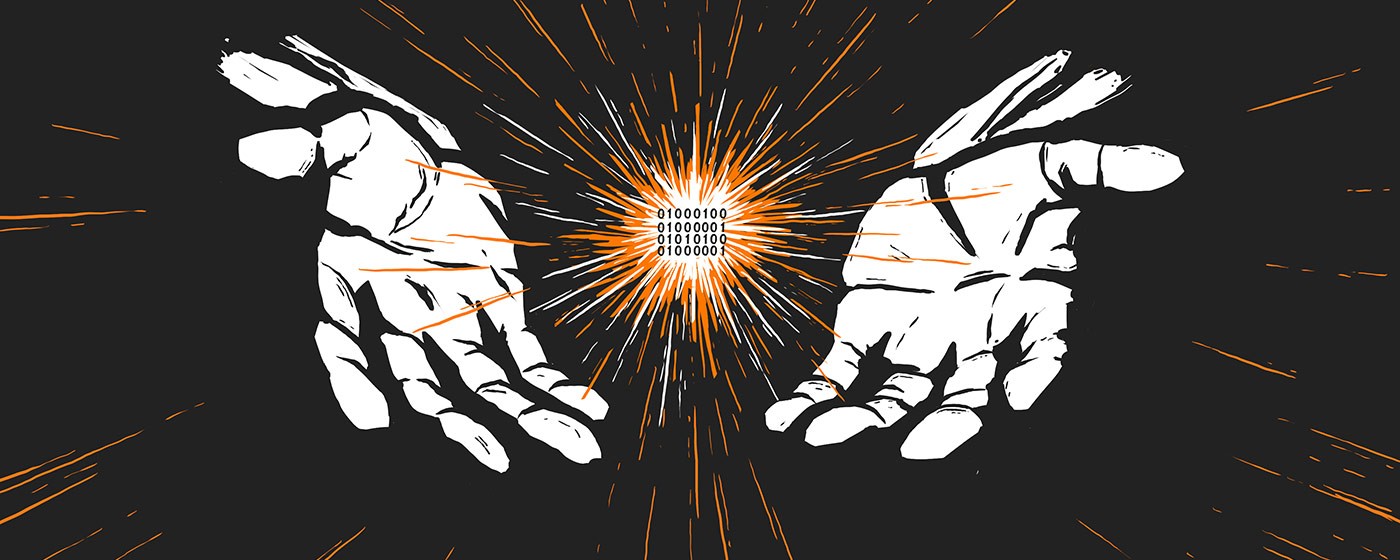


The Year is 2030
Our everyday life is organized by artificial intelligence that connects and communicates with a global computer network that is constantly being fed with our data. Over the years of using the Internet we have become normalized into sharing our data at the click of a button. But right now we are standing at the fork in the road and the good thing is: We still have the choice! Imagine a world where a law states that your raw data is your own – regardless of what product or which service you use. A world where your digital footprint, your content and all the information you leave in cyberspace cannot be shared or used for profit by others unless you give permission. Imagine that you manage your encrypted data yourself. Imagine that you have APIs, the raw files and the control to decide how service providers learn from you. Just like the Internet brought us 21st century industries like tech startups, social networks and the e-commerce sector, this new legislation will see the growth of more new industries.

Scenario 1
The Future of the Tech Giant
At the 2013 AGM, Google acknowledged their concern about the public want of privacy and what it will mean for their business and reputation. In 2015, Facebook announced $3.5 billion in advertising revenue during the fourth quarter of 2014 alone. Companies are scrambling to use their algorithms and our data for targeted ad placement. Both of these tech giants have created a whole new business model away from the humble beginnings of a search engine and a social media platform. This leads us to the question of how “free” services will survive when the new legislation puts the user back into control of the data. This could mean a user needs to pay a fee to sign up, but this small financial sum would be far less detrimental than a lifetime of raw data online for the exploitation and profit of the corporations. Or, imagine a world where the user can sell their data to service providers so that they can benefit from customized marketing, in control of what adds they see and choosing what they are interested in. The new legislation could also mean a completely new form of social network and search engines, ones that are crowd-funded and free from tracking and advertising. A future industry built on a genuine mutual interest in privacy, giving users the opportunity to learn and explore the true meaning of democracy, individuality and free-society. One thing is for certain: Google, Facebook and all the other tech giants will not exist as we know them.
Scenario 2
A better world through decentralized structures
In 2030, society will live in a digital paradise. We have been empowered with free access to knowledge and digital education. We are a society that is open, tolerant, transparent and creative. The power of the Internet is no longer with the corporation or the government and the architecture of the Internet is based on liberty of the individual. The individual will be able to decide freely with whom their data is shared and used, and there is no fear of losing independence. The Internet will serve as a butler in your everyday life. Every individual has the possibility to realize ideas as information can be shared globally with other parties. This will promote a new dynamic of a creative economy. The function of the big corporation disappeared along with their power and we see an increase of new smaller, innovative systems. The impact: It is the end of capitalism, and the start of a true sharing economy – business models that are based on regulated self-management and transparent exchange. The state structure will be turned upside down, there are no central authorities and each networked citizen represents themselves.
Scenario 3
Forward to the roots
In 2030, the technology boom is a thing of the past. Mankind will have realised the cost of freedom and individuality that technological advancements brought them. People live happier lives and protect themselves, their families and their information within their own private sphere. All digital devices are run with operating systems that protects the user’s data. Purchases are made at local markets and people have re-learned how to provide for themselves. The economy is built on self supporting citizens who value the freedom to decide. And so, the infrastructure of the material world will decay and in this possibly unlikely world, we are living in a one-world state without nationality, but as citizens of the earth. Unlikely.
Scenario 4
Data currency
If our Data is available to us, the world as we know it will evolve from what we know it as now. Maybe we will be able to commoditise our own data and trade it on the stock market? Or, people can choose to pay for their groceries at the supermarket with sharing the value of data in exchange? By reclaiming the power of our data, the data sales industry will be ours to profit from, no longer Google’s or Facebook’s. Corporations like eBay will take a whole new approach and offer the opportunity to sell elements of our data to others as a way of earning money. We see new industry emerging with services that can store, maintain and control our digital footprint. So, like we call an agent today to help us buy, sell or rent a new home, we will each have a data agent with whom we can discuss exactly what elements of our data exist about us, and which parts can be sold or should be kept privately. Data agents will be normal and regulated, unlike the way it is today. The data agent today has a specialist role with knowledge of how to track people and create user profiles based on their online movements and digital preferences. Today, this role is abused by our willingness to give away our information through simple online transactions and the greediness of big corporations. In the future, these specialists will be working in a brand new digital landscape.
Scenario 5
Health Crowdfunding
In the year 2015 we are seeing the beginning of wearable technology. This year, Apple alone will collect biometric data from an expected user-base of over 10 million people using their Apple watch. In a world with new laws ensuring digital privacy, we have control of our biometric data and are able to make the world a better place and act as ethically responsible global citizens. Our transparent donations of health data from wearable technology to medical research institutes will give crowd funding and crowd campaigns new life. Each one of us will have the opportunity to support medical research that will benefit humanity and not the profit of the tech giants.
Comments